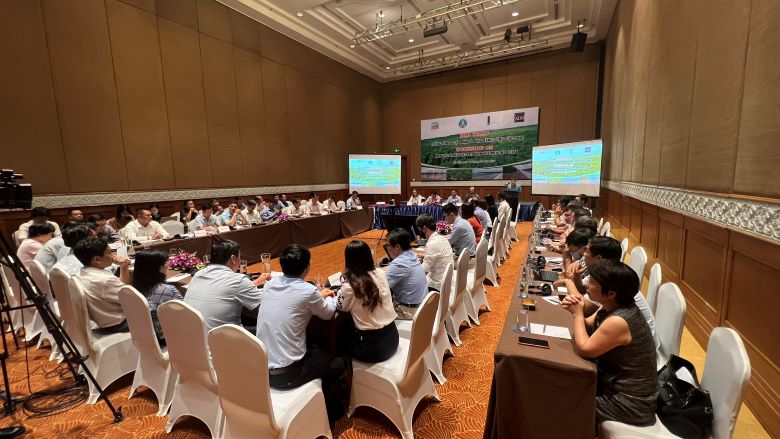Mangrove afforestation in Mekong Delta: Indispensable for climate response in Vietnam
Mangroves, which can hold up to four to five times more carbon per hectare than tropical rainforests, are critical for coastland in climate-hit areas like the Mekong Delta.
Dutch experts have stressed the importance of mangrove afforestation in the Mekong Delta, the biggest granary of Vietnam, amid the increasing impact of climate change.
| Willem Schoustra, Agricultural Counselor of the Netherlands Embassy in Hanoi. Photos: The Netherlands Embassy in Hanoi |
“We actually have no choice, we have to invest in nature resolutions, agriculture protection to keep a right path in the future,” Willem Schoustra, Agricultural Counselor of the Netherlands Embassy in Hanoi has said.
“We have to overcome challenges, including socio-economic consequences to people living on the coastline,” Schoustra told The Hanoi Times in a workshop on mangrove afforestation in the Mekong Delta held in Hanoi last weekend.
Sharing the same idea, Dr. Paul Erftemeijer from Royal HaskoningDHV stated that it’s necessary to take drastic measures to combat the serious climate challenges to the Mekong Delta for sustainable coastal resilience.
It’s time to take action, including building mangrove belts to deal with a serious state of degradation in the region which is home to one-fifth of Vietnam’s population, the expert said at the workshop, which is aimed at raising awareness of mangrove afforestation and protection through communication activities for the alignment of planning and implementation of mangrove projects.
He highlighted the role of living with nature at the event marking the participation of nearly 100 scholars and officials from Vietnam’s Ministry of Agriculture and Rural Development (MARD), the Netherlands Embassy, the Asian Development Bank (ADB), World Wide Fund for Nature (WWF), International Union for Conservation of Nature (IUCN), among others.
| Overview of the workshop on mangrove aforestation. |
Role of mangrove
Mangroves can hold up to four to five times more carbon per hectare than tropical rainforests.
Given the soft-sediment environment, the mangrove-sea-dike combination (green-grey) is the preferred option for a sustainable coastal defense system at acceptable construction and maintenance costs.
As a matter of fact, the Government of the Netherlands and ADB have committed to supporting the Government of Vietnam in strengthening the coastal zones of the Mekong Delta and the resilience of its inhabitants.
MARD is working to restore the natural environment and enhance coastal protection to increase resilience to the impacts of climate change in five provinces in the Mekong Delta, namely Bac Lieu, Soc Trang, Tra Vinh, Ben Tre, and Tien Giang for 2023-2029.
The project is expected to be financed by ABD loans. The Netherlands government has commissioned a consortium of Royal HaskoningDHV and Wetlands International to assist MARD and ADB by contributing to the early stages of project development for the mangrove afforestation project.
Highlighting the role of mangroves in coastland in the Mekong Delta, Dr. Pham Thu Thuy, Team Leader of Climate Change, Energy and Low-carbon Development, at the Center for International Forestry Research (CIFOR), pointed out three key fields that mangroves effect, namely aquaculture, biodiversity, carbon credit market.
Obviously, mangroves provide nursery habitats for many species, contributing to sustaining the local abundance of fish and shellfish populations. However, given rapid urbanization that results in employment structure, young people tend to leave mangrove farming in 2030-2050. It becomes urgent to have long-term mangrove afforestation.
Experts added that as coastland is home to various species and creatures, biodiversity must be taken into account in growing mangroves. Interestingly, mangrove forests contribute to species richness, providing habitat for thousands of species at all levels of marine and forest food webs.
Thuy highlighted the importance of mangroves in carbon absorption, saying that mangroves are powerful carbon sinks as they can store up to 4 to 10 times more carbon than forests. For that reason, mangrove carbon credits have become more important in the global carbon market, accounting for 30% of the global carbon market in 2021 from 20% before 2020.
It can be said that mangroves are typical for the high-quality carbon market, priced at around $67-$167/unit compared to $5-$11/each from forests, she noted.
Sharing the same idea with Dr. Thuy, Tran Quang Bao, Deputy Director of the General Department of Forestry, said that mangrove forestation in the Mekong Delta needs to prioritize biodiversity and livelihood. As the region is home to land and water specifications, aquaculture models, it requires combined efforts from all stakeholders to ensure biodiversity and livelihood, he told The Hanoi Times.
The project should cover lessons from the Netherlands in which components on improving livelihood remain an inseparable part, he said, noting that Netherland expertise is helpful for Vietnamese experts and farmers in the long-term drive.
For experts, it’s undeniable that mangroves are powerful nature-based net-zero solutions.
It is clear that a holistic approach that goes beyond mangrove restoration alone is required to create the right conditions in the long term for the preferred green-grey coastal-defense infrastructure.
This long-term approach finds its base in Resolution No.120 (in 2017) and the Mekong Delta Integrated Regional Plan (in 2022) and will be further implemented in provincial master plans.
In this regard, Vietnam is recommended to make fruitful collaboration, requiring the engagement of all stakeholders much as possible in the Mekong Delta. Coordination among international partners, research institutes, and the private sector is essential for forests in general for a resilient future.











